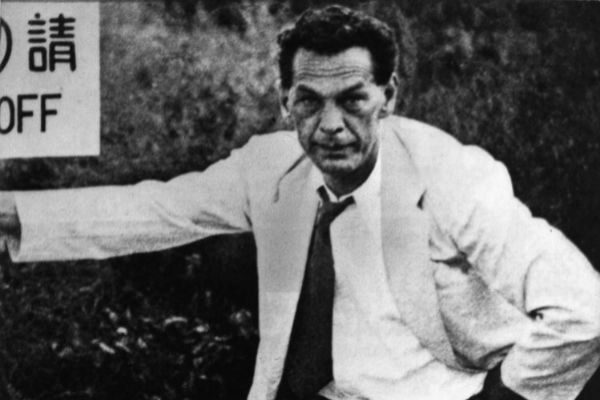- Garbo. The brilliant invention of Juan Puyol
- László Almásly.The true English patient
- Eddie Chapman. The man who cheated the Nazis
World War II was won by military crush , not by revealing secrets of the enemy. At first, Germany and Japan devastate others with superior armies; afterwards, the allies counterattack with unsurpassed industrial power. The axis runs out of resources and still lengthens the conflict until the final destruction. Espionage, in this war process, is almost irrelevant. The breaking of the Enigma code by the British marks the peak of this secret war, as well as the misinformation caused by the network of deception of agent Juan Pujol, aka Garbo. However, another spy was about to change the fate of that apocalypse. The problem is that nobody heard him. His name was Richard Sorge.
Sorge was born in the current Baku of a German father and a Soviet mother . That combination would mark his life. After two years, his family moved to Germany, where he learned the language and studied political science. He served the Kaiser in the Great War of 1914, won the iron cross for his courage in combat, was injured and then, in a hospital in Berlin, was aware of the real cost of the war on the civilian population. Like many young Germans, including the nurses who took care of him, he saw an answer in socialism.
In 1924 he began his activity as an informant for the Communist International in Frankfurt and won Soviet intelligence. He left his life and moved to Moscow, where he was trained as a spy. He made his first works in the United Kingdom, Scandinavia and in his country, Germany . Its objective is for the Bolshevik revolution to extend beyond the limits of the USSR. In a few years, these young communists would dispute the German streets in sticks with the brown shirts of the Nazi Assault Section. At that effervescent moment he was assigned to Shanghai to study the movements of the Japanese Empire.
In Shanghai, he posed as a journalist for Soziologische Magazin magazine and collected lovers who were his best informants, such as journalist Agnes Smedley or reporter Hotsumi Ozaki. Sorge wore silk suits, was very cultured, had people and did not miss a party at the homes of diplomats. Thus he knew that Japan would invade China long before it happened. It would be the first time Stalin ignored his reports, despite the evidence.
With Hitler in power and his own National Socialist Party card (affiliate number 2,751,466) he went to Japan, where he continued with his journalistic cover, this time with the credential of the Frankfurter Zeitung , the best selling newspaper of the time. Appearing to be a convinced Nazi, Sorge managed to enter the circles of the Reich embassy and make friendship (sincere) with Eugen Ott, military attache in Tokyo, but with whose wife he secretly lay down for six years while maintaining a relationship with the Japanese Hanako Ishii
When World War II broke out, its network of informants was so fluid that it had key information before anyone else in the USSR that would have changed the sign of the conflict. Germany was not only going to breach the non-aggression pact with Moscow, but was planning to invade the Soviet Union on June 20, 1941, so it transmitted its report to the Kremlin. Stalin scoffed: "How am I going to believe a pervert who organizes factories and brothels in Japan?" The German attack was not June 20 but the 22. The USSR denied the offensive again and again even days after it began. No wonder: in the 1930s, the best spy network worldwide was the Soviet, but most of its agents were purged or ignored by Stalin.
Months later, already with the Germans at the gates of Moscow, Stalin did listen to Richard Sorge. From Tokyo, again using the information he got in bed with his lovers, he assured that the Japanese did not plan to attack the USSR immediately. Stalin then moved several divisions of Siberian skiers defending Manchuria to the outskirts of Moscow. Wehrmacht reconnaissance patrols already glimpsed the golden domes of the Kremlin from afar, but those cold-adapted refreshment troops were capitals to keep the Russian capital away from Hitler's clutches and defeat German troops in a decisive battle .
It was not the last service he provided to the USSR. Thanks to his network, he knew that the Japanese would attack Pearl Harbor before Washington . The attack was a surprise to all but him, who ended up falling into an anti-communist raid in Tokyo. One of his informants, the painter Miyagi, ended up confessing that Sorge was an enemy agent before the torturers of the Kempeitai, the Japanese Gestapo. The Japanese imprisoned him and proposed up to three times for the Soviets to exchange him for a valuable Japanese prisoner. On all three occasions Moscow refused: "We don't know Richard Sorge . " Interestingly, the ones who did the most to save his life from a secure execution were his friends from the German embassy, whom he had spied on for years. He was hanged on November 7, 1944. Until 1964 he was not publicly recognized.
At the service of the USSR
- Name : Richard Sorge.
- Code: Ramsay.
- Organization: GRU (Military Intelligence of the Soviet Union).
- Service time: From 1924 to 1943
- Achievements : He warned Moscow of the Barbarossa operation to invade the USSR by the Third Reich, but Stalin declined to listen to him.
- Decorations: Iron Cross and Hero of the Soviet Union.
According to the criteria of The Trust Project
Know more- history
- WWII
- culture
HistoryThe experience of the Finnish sniper who killed five Russians a day
The Paper Sphere Tom Treanor, the best World War II reporter
History Churchill, Hitler, Franco and the actor of 'What the wind took away' that could change World War II

